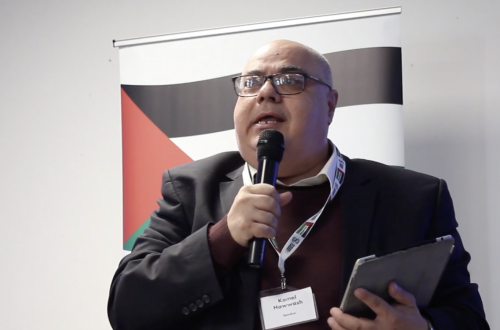This is a guest post by James Vaughan
The Yom HaShoah 2013 National Commemoration takes place this weekend on Sunday 7 April. The National Memorial to the Holocaust was inaugurated in Hyde Park in 1983, largely thanks to the efforts of the Board of Deputies of British Jews and its then President, Greville Janner. However, documents released by the National Archives show that the Secretary of State for Foreign and Commonwealth Affairs, Lord Carrington, actively sought to prevent a formal British Government connection to a Holocaust memorial. Indeed, it took a resolute and principled series of stands over the course of 1980-81 by the Secretary of State for the Environment, Michael Heseltine, and by Margaret Thatcher herself, to ensure that Britain’s first public memorial dedicated solely to victims of the Holocaust was established.
In April 1980, the Foreign and Commonwealth Office learned that Michael Heseltine had intimated to the Board of Deputies that the British Government would support a proposal for a Holocaust memorial located on Richmond Terrace, within a few hundred yards of the Cenotaph. The Foreign Secretary’s response was swift and hostile. Paul Lever, Carrington’s Private Secretary, contacted 10 Downing Street to express the Foreign Secretary’s opinion that a memorial to the victims of the Holocaust in the heart of Whitehall was inappropriate. Lord Carrington believed, he wrote, ‘that any monuments in the area concerned should be of a British national character.’
The implication that a Jewish-sponsored Holocaust memorial in Whitehall was somehow ‘un-British’ was merely the first in a series of Foreign Office arguments designed to forestall Janner’s initiative. Heseltine met with Janner in November 1980 to explain that Richmond Terrace site had been ruled out ‘on the grounds of security.’ Janner and the Board of Deputies accepted this without protest and instead seized enthusiastically upon Heseltine’s suggestion that a garden of remembrance could be located in one of the royal parks. The Foreign Office, however, remained hostile to the project and another of Carrington’s Private Secretaries, Francis Richards, noted that the Foreign Secretary ‘continues to have very considerable reservations about the proposed memorial’ and that ‘the removal of the memorial from Richmond Terrace to one of the London parks, and its transformation from a monument into a Garden of Remembrance, do not remove his doubts.’
Foremost among these was the less than convincing argument that the British Government’s formal association with a Holocaust memorial would constitute a threat to harmonious relations with West Germany. ‘The main target of the criticism implied in the memorial would be Germany,’ Richards argued before noting that ‘the Federal Republic might wonder why HMG needed to be a party to the construction of a memorial that would generally be taken as condemning a country which is now one of our closest allies.’ A further consideration, raised earlier by Carrington, was the possibility that ‘some Arabs’ might interpret a British Holocaust Memorial as ‘endorsing [the Israel Prime Minister] Mr Begin’s point that the fate of the European Jews in the 30s and 40s should influence British policy on the Arab/ Israel question in the 80s.’ Yet another protest was based on the FCO’s assertion that ‘it is by no means self-evident that Crown land in London should be used for a memorial to events which did not take place on British territory or involve a large part of the British population.’
The cumulative result of these considerations, Richards concluded, was that
‘The Foreign and Commonwealth Secretary would greatly prefer it if the Jewish community could be encouraged to buy or lease their own site in London to erect a memorial there or to create a park or playing field (which he would consider far more appropriate) according to their own wishes.’
Opinions of this kind led Downing Street officials to advise Thatcher that a meeting at Prime Ministerial level was now necessary since ‘Lord Carrington is still trying to kill the whole project [and] the Foreign and Commonwealth Secretary is unlikely to stop sniping on this subject until he has had a chance to put his views to you.’
A meeting between Thatcher, Carrington, Heseltine and the Home Secretary, Geoffrey Howe, was eventually held on 12 November 1981. Carrington’s hostility to the idea of a Holocaust memorial on Crown land remained implacable. ‘The Memorial,’ he stated with remarkable insensitivity, ‘had nothing to do with Britain.’ Carrington again argued that the proposed memorial would be ‘offensive to the Federal Republic of Germany’ and he repeated his preference for the British Jewish community to instead ‘create something useful like a playing field.’
It is clear that Thatcher had already made up to dismiss the majority of Carrington’s concerns and in an earlier letter to the FCO her Private Secretary, Tim Lankester, had announced that the Prime Minister was ‘not convinced that the Government will face criticism at home or overseas simply for making crown land available.’ Thatcher’s only real concerns about the Memorial involved a fear that it might prove vulnerable to desecration by the National Front. The meeting ended in a comprehensive defeat for Carrington and the FCO. The Prime Minister’s record of the meeting show that the meeting adjourned with a firm statement that it had been agreed that Heseltine should contact the Board of Deputies to confirm that the Government was sympathetic to the proposal for a Holocaust Memorial in Hyde Park, provided that the Board of Deputies was content that the risk of vandalism was not a decisive factor.


